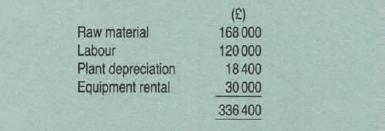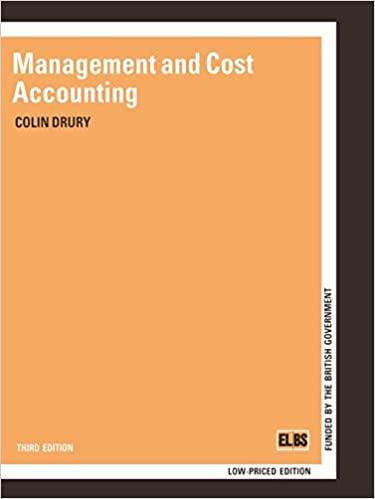Advanced: Calculation of a contract price Involving monthly discounting and compounding Franz! is a contract engineer working
Question:
Advanced: Calculation of a contract price Involving monthly discounting and compounding Franz! is a contract engineer working for a division of a large construction company. He is responsible for the negotiation of contract prices and the subsequent collection of instalment monies from customers. It is company policy to achieve a mark-up of at least 10% on the direct production costs of a contract, but there is no company policy on the speed of customer payment. Franz!
usually attempts to persuade customers to pay in six-monthhy instalments in arrears.
Franz! is presently engaged in deciding upon the minimum acceptable price for contract K491, which willlasl for 24 months. He has estimated that the following direct production costs will be incurred:

On the basis of these costs Franz! estimates that the minimum contract price should be £370 000. The raw material and labour costs are expected to arise evenly over the period of the contract and to be paid monthly in arrears. Plant depreciation has been calculated as the difference between the cost of the new plant (£32 400) which will be purchased for the contract and its realizable value (£14000) at the end of contract. Special equipment will be rented for the first year of lhe contract, the rent being paid in two six-monthly Instalments in advance. The contract will be financed from head office funds, on which interest of 1 % per month is charged or credited according to whether the construction division is a net borrower or net lender.
Requirements:
(a) Calculate the net present value of contract K491 assuming that Franzl's minimum price and normal payment terms are accepted. (5 marks)
(b) Assuming that the customer agrees to pay the instalments in advance rather than arrears, calculate the new contract price and mark-up that Franz! could accept so as to leave the net present value of the contract unchanged. (5 marks)
(c) Prepare two statements to show that the eventual cash surpluses generated in
(a) and
(b) are identical. The statements need show only the total cash received and paid for each category of revenue and expense. (6 marks)
(d) Discuss the factors that should influence the tender price tor a long-term contract.
Step by Step Answer:






